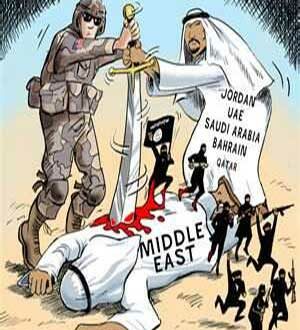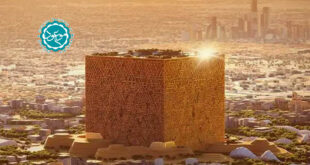The two holiest cities of Islam—Makkah and Madinah under the occupation of Aal Saud
The Muslim world is in so much turmoil because Muslims have allowed the two holiest cities of Islam—Makkah and Madinah—to fall into the hands of primitive savages from the darkest crevices of the desert in Nejd, Central Arabia. It is important to know where the House of Saud emerged from.
Many problems confronting the Muslim world can be traced directly or indirectly to the House of Saud that controls the Arabian Peninsula. What is less well known, especially among Muslims, is the origin and nature of this clan-based family from the deep crevices of Central Arabia. It is important to trace their origin to better understand the role they play and who supports them in pursuing their nefarious agenda.
In 1744ce, an alliance was struck in Najd, Central Arabia that was to have far-reaching consequences for the whole of the Arabian Peninsula and later the Muslim world. A self-styled preacher named Muhammad ibn ‘Abd al-Wahhab, claiming to be influenced by the teachings of Imam Ibn Taymiyah (died 728ah/1328ce), emerged in Najd allegedly to cleanse Islam of its degrading accretions. In his zeal, Ibn ‘Abd al-Wahhab ordered many shrines and tombs to be destroyed. As a self-proclaimed qadi (judge), he instituted death by stoning for those proclaimed guilty of adultery.
Najd had no organized society at the time. People lived as part of clans and tribes and wandered in the desert in search of water and food. Ibn ‘Abd al-Wahhab too had wandered eastward toward the Persian Gulf but supposedly in quest of knowledge. He is reported to have gone through a phase of Sufism, finally settling for the strict interpretations of what he understood to be the teachings of the Hanbali scholar Imam Ibn Taymiyah.
But Ibn ‘Abd al-Wahhab did not find the Najdis prepared to accept his half-baked literalist interpretations that had little basis in the Qur’an or the Sunnah of the noble Messenger (pbuh). Both his father and older brother Sulayman chastised him for his distorted views. In fact, his father forbade him from propagating such views in public. As long as his father ‘Abd al-Wahhab was alive, the son kept largely to himself. In 1744 he moved to Dar‘iyyah, a few miles north of Riyadh where the local chief and bully, Muhammad ibn Saud, welcomed him. Ibn Saud needed a religious crutch to lend him respectability. The combination proved deadly. Inter-marriages took place between the children of Ibn ‘Abd al-Wahhab and Ibn Saud. Soon, the Saudi hordes erupted from Dar‘iyyah first subduing Riyadh and then bringing virtually the whole of Najd under their control.
The children of Ibn Saud and Ibn‘Abd al-Wahhab, now called Wahhabis, inter-married and multiplied. And they continued to raid settlements and caravans in the tradition of Arabian tribes of the time. In 1802 they turned their attention to Makkah and Madinah. When Ta’if, 40 miles south of Makkah, resisted the assault, every male inhabitant that the Wahhabis could lay hands on was slaughtered. The terrified people of Makkah and Madinah opened their gates in the hope that they would be spared the fate of Ta’if. With the people subdued, the Wahhabis resorted to their now-infamous activity of targeting religious shrines and places of historical importance. These were smashed without regard to their significance in Islamic history. When the pilgrim caravans from Syria and Egypt arrived, they too were driven back and condemned as mushriks and kafirs. Thus, the Wahhabi raiders prevented Muslims from performing Hajj, one of the fundamental pillars of Islam, by hurling accusations of takfir against them.
When news of the Ta’if massacre and pillage and destruction of Makkah and Madinah reached the sultan (khalifah) in Istanbul, he was furious. The Hijaz, that contains the two holy cities of Makkah and Madinah, was under Uthmaniyyah (Ottoman) jurisdiction. The sultan ordered Muhammad ‘Ali, his viceroy in Egypt, to punish the Wahhabi raiders. In 1813, Makkah and Madinah were freed from Wahhabi control but taking Dar‘iyyah, in the Najdi heartland, proved more difficult. Finally, in 1819, Muhammad ‘Ali’s son, Ibrahim Pasha, defeated the Wahhabis and their capital, Dar‘iyyah, was razed to the ground. The Wahhabis never rebuilt it. Instead, they left it in dilapidated state, like a ghost town, as a relic to their presumed past glory. They moved down the Wadi Hanifah to Riyadh to build their new base, only to lose that in 1891 to the Ibn Rasheeds from Hayl.
The Wahhabis, now led by ‘Abd al-Rahman fled eastward and sought refuge with Shaykh Mubarak al-Sabah in Kuwait. ‘Abd al-Rahman’s son, ‘Abd al-‘Aziz ibn Saud, the man credited with establishing the modern State of Saudi Arabia, was then in his teens. While ‘Abd al-Rahman sulked in his tent on the outskirts of Kuwait, young ‘Abd al-‘Aziz ibn Saud went on raiding parties with members of other tribes. Looting and plundering was the way of the bedouin. ‘Abd al-‘Aziz ibn Saud soon gained notoriety for his ruthlessness and guile.
In January 1902, ‘Abd al-‘Aziz ibn Saud led a group of men to stage a stealth attack at the Mismak fortress in Riyadh. In the early morning raid, Ibn Rasheed’s governor, Shaykh Ajlan, was killed and the garrison surrendered. Once dependent on the Ibn Rasheeds for survival after their rout from Dar‘iyyah (1819), the Ibn Sauds now became their mortal enemies. After the capture of Riyadh, other skirmishes followed with the Ibn Rasheeds, but ‘Abd al-‘Aziz survived either by stroke of good luck as at al-Dilam (1903) or by bribing tribes loyal to Ibn Rasheed. In 1905 he pledged loyalty to the Turkish sultan but did everything to undermine it. The following year, ‘Abd al-‘Aziz ibn Saud killed Ibn Rasheed, also named ‘Abd al-‘Aziz, who had the backing of the Turks, at Rawdah al-Muhanna, thus crippling the Ibn Rasheeds’ power in Najd. In between, ‘Abd al-‘Aziz ibn Saud indulged in his favorite pastime — that of robbing caravans — without any distinction between merchants and pilgrims. In fact, robbing caravans was the favourite activity of all Arabian chiefs; ‘Abd al-‘Aziz was simply the biggest thief.
Since his days in Kuwait, the young‘Abd al-‘Aziz had realized that control over his territory could only be exercised with external support. The Arabian tribes were forever fighting each other. He could not turn to the Turks for help because they were supporting the Ibn Rasheeds. ‘Abd al-‘Aziz had witnessed how the other external power —Britain — had already assisted Shaykh Mubarak to retain control in Kuwait. Might not Britain be interested in helping Ibn Saud fight the Turks? Any overtures that ‘Abd al-‘Aziz made to Britain at the time were rebuffed. Imperial Britain was far too preoccupied with the Hijaz to pay any attention to an upstart clan chief from the dark crevices of Najd. If Britain had need for any Najdis, their loyalty could be purchased easily.
Britain’s interest in the Hijaz was not only commercial, with the important Red Sea port at Jeddah, but also political. The British had realized that control of the area must not only be wrested from the Turks but placed in the hands of someone who would do Britain’s bidding. The Hijaz, with the Haramayn —the two holy cities of Makkah and Madinah — was far too important to be left to the Muslims. The Haramayn, and especially Makkah could be used as a focus of propaganda against the British government. In fact such sentiments were expressed by Captain R.F. Burton (later Sir Richard Burton) in the early-1850s when he visited Makkah and Madinah. A few years later, the British Consul at Jeddah, Zohrab, spelled it out even more clearly,
The point of real importance to England politically, I believe, the Hedjaz (sic), as the focus of Moslem (sic) thought and the nuclear (sic) from which radiate ideas, advice, instructions, and dogmatic implications… The Hedjaz is also a point of much political important (sic) to England and its relations with India… (Certain persons) I am persuaded, proceed on the Hadj (sic) for political reasons. Mecca being free for (sic) European intrusion is safe ground on which meetings can be held, ideas exchanged… Up to the present time we have kept no watch on those who come and go… thus meetings may be convened at Mecca at which combinations hostile to us may form without our knowing anything till the shell burst in our medst (sic)… If this Consulate could have a trusty Mussalman agent at Mecca, I believe a great deal of valuable intelligence could be obtained.
In fact, he went further. Zohrab later claimed that since there were 60 million British Muslim subjects compared to Turkey’s 16 million, Britain had a greater right to appoint the Sharif (amir) of Makkah!
The appointment of the Sharif of Makkah had devolved on the Turkish sultan since the Hijaz was made a vilayet (province) of the Uthmaniyyah State in 1840. From the turn of the century, Britain cultivated independent links with the Sharif of Makkah in an attempt to use him against the sultan in Istanbul. At the same time, by infiltrating Turkish forces and co-opting their members into Masonic Lodges, Britain and France undermined the authority of the Turkish sultan. In July 1908, Young Turks, operating under the name of the Committee for Union and Progress, seized power and sent Sultan ‘Abd al-Hamid II into exile. This opened the gates for the balkanization of the Muslim East. Husayn ibn ‘Ali, who was appointed amir of Makkah on November 1, 1908, now exercised far greater “independence” from Istanbul than his predecessors had enjoyed. Propped up by British money and guns and the intrigues of British agents like T.E. Lawrence, Sharif Husayn started to have visions of ruling the whole of Arabia, free from Turkish control. The British did everything to encourage him in this, for they needed the Arabians to rebel against Turkey. This was the classic British policy of divide and rule. They promised Sharif Husayn the throne of the whole of Arabia in return for his rebellion against the Turks.
Long before the British promise to Husayn ibn ‘Ali, the Turks had seen through their game. In a candid and quite perceptive commentary in the Makkan newspaper, Hijaz, the Turks expressed their suspicions of British designs on the Hijaz, “Those who watch the English Government can see that her designs are directed toward the holiest places of Islam. She wishes to occupy them but she knows that achieving such a purpose would not be an easy matter, and she therefore tries by the most devilish means to reach this end.” (Hijaz, No. 1896, 25 Safar 1333ah (1914ce), p.1).
As events progressed, Britain’s “devilish” plans unfolded much as Turkey had predicted.

 Mouood Mouood English Edition
Mouood Mouood English Edition



